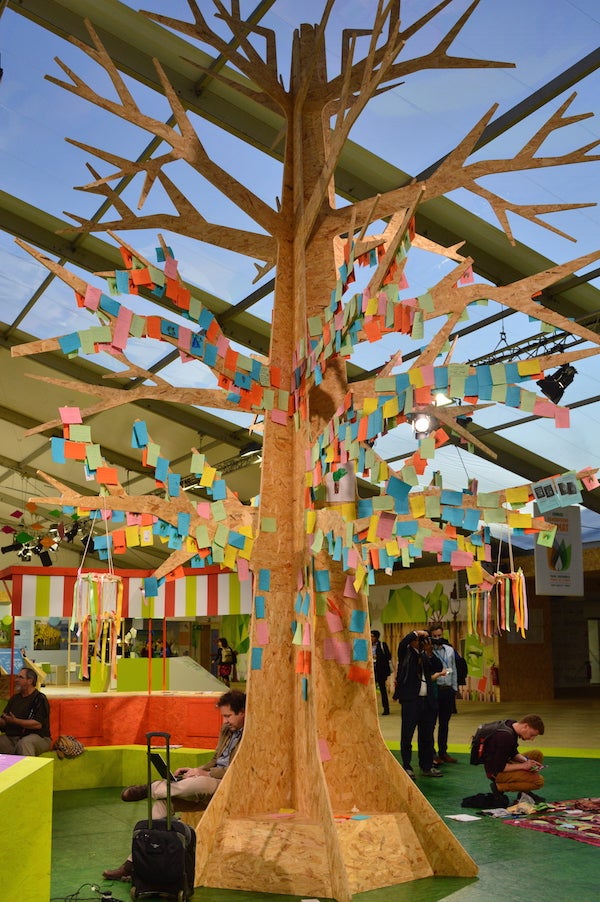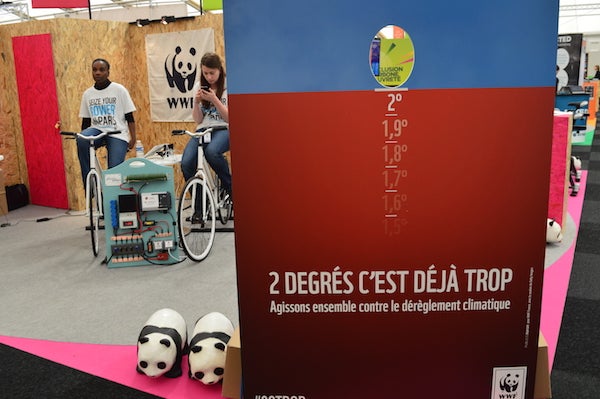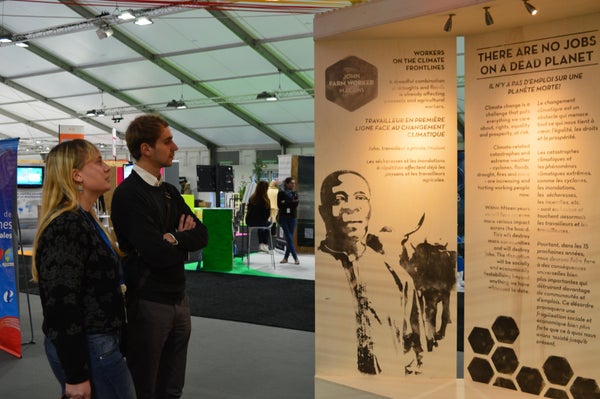This article was published in Scientific American’s former blog network and reflects the views of the author, not necessarily those of Scientific American
Le Bourget in Paris is sizzling with youthful energy.
More than 40,000 people have gathered in Paris for the 21st annual Conference of Parties (COP21) in an attempt to address the growing threat of climate change. Among them are heads of government; business and religious leaders; scientists; and citizens of civil society. It’s a compelling display of collective action—and as you navigate the site’s makeshift walls, whimsical décor, and palpable sense of enthusiasm, close to half of the faces you see belong to young people.
Climate Change is the issue of the millennial generation. Millennials, research suggests, are increasingly driven and motivated by a sense of purpose. As the world’s greatest cities risk disappearing under water during our lifetimes, the call to save the world we know becomes more compelling. When we imagine our future, we fear a world that is thronged with climate refugees; where changing weather patterns threaten the food security of the earth’s population, which will likely reach 10 billion inhabitants by 2050; and where rising economic inequalities are exacerbated by the unequal ability of individuals in different parts of the world to adapt to climate change. While climate negotiators quibble over limiting the temperature rise to 1.5° degrees vs 2° Celsius, millennials understand that the problems of 2050 are already our problems.
On supporting science journalism
If you're enjoying this article, consider supporting our award-winning journalism by subscribing. By purchasing a subscription you are helping to ensure the future of impactful stories about the discoveries and ideas shaping our world today.

Young peoples' messages to the planet Earth hang from the sculpture of a tree at the COP21 Climate Generations Forum
We understand the stakes.
Yet perhaps, in a departure from past attempts to confront climate change, young people are also aware of our own agency to be a part of the solution. “We can’t wait for another meeting that leads to another meeting,” said a 17-year-old youth delegate named Brianna Fruean, from American Samoa, whose future is threatened by the harsh reality of the island disappearing under water. “We need to act now,” she said a panel discussion.
COP21 is a prime example of how millennials are taking ownership of the climate’s future. No longer passive observers, young people are participating in this year’s COP as members of official delegations, NGO representatives, and as part of a broader youth movement that has already created powerful momentum to tackle climate change.
Since 2005, young people have held a parallel Conference of Youth (COY), that this year welcomed 5,000 youth leaders from around the world here in Paris. Its motto, “youth as agents of change,” underscores the progress that young people have already made towards combating climate change. Side events at the COP showcase success stories of young people integrating sustainability into kindergarten curricula in Canada, recycling cell phones to eliminate e-waste in Africa, and mapping resources for climate adaptation in Samoa.

Young women take a break to top up their cell phones using bicycle-powered chargers, behind a sign that reads "Two degrees is already too much."
And in a talk at the UN General Assembly at COP21 earlier this week, 15-year-old indigenous climate activist Xiuhtezcatl Roske-Martinez, who comes from Boulder, Colorado but who was raised in the Aztec tradition, summarized the achievements of young people to date, and ignited the hearts and minds of young and old alike:
“Everywhere young people are rising up and taking action to solve the issues that will be left to our generation … Over 400,000 people marched in through the streets of New York City in the world’s greatest climate march. More than 220 institutions have divested from fossil fuels with the help of student-led movements and the number continues to grow. Youth are suing their state and federal governments across the United States, demanding action on climate change from our elected officials. We are flooding the streets and now we are flooding the courts to get the world to see there is a movement on the rise and we are at the forefront, fighting for the solutions we need.”
It’s no surprise that young people are effective organizers. Climate change is a collective action problem, a problem we’ve been trained to deal with through Facebook, Twitter and social media. The Internet—like climate change—is a great equalizer. Hashtags like #2050startsnow, the motto of Scotland's youth-oriented 2050 Climate Group, dominate the twittersphere. As COP21 kicked off in Paris, a new youth movement called Climate Strike organized walk-outs, film screenings and art performances worldwide. Working in collaboration with strangers for things that we care about is not a foreign concept; it’s a welcome challenge.
Young people also come to the climate movement at a time when policymakers have become increasingly aware that the solution to climate change does not lie solely within governments. The UN Framework Convention on Climate Change (UNFCC) homepage features a youth portal where people can organize and share opinions. Since 2009, COPs have welcomed youth delegates to the negotiations through the YOUNGO coalition—an international network of 2,000 young people that make up the youth climate movement. Its purpose is to empower young people with the skills they need to make a difference.
Beyond organizing, young people are also putting our heads together to come to solutions about climate change. Activists from climate change ask for three simple solutions: keep fossil fuels in the ground, transition to 100% clean energy and support the victims of climate change. The Commonwealth Alliance for Climate Change distributes policy recommendations and voluntary commitments, including funding proposals to build the skills of entrepreneurial young people starting low-carbon businesses. . Scotland’s youth climate group, and many like it, are organizing dialogues between youth delegations and government climate issues year-round—not just when COPs are in session.
The youth movement is not free of the politics and concerns that plague official delegations. YOUNGO—the official youth constituency at the United Nations—holds daily meetings that percolate with evidence of the North/South divide. In one meeting this week, delegates from Southern countries called for more drastic action and larger sit-ins in front of negotiation conference rooms, propelled by an awareness that their countries are more seriously affected by climate change than Northern nations. But even these disagreements are born out of a greater understanding of the ripeness of the climate issue, and our opportunity to influence the course of the world before it’s too late.
“In the light of a collapsing world, what better time to be alive than now, because our generation gets to change the course of history,” Mr. Roske-Martinez said. “Humans have created the greatest problem we face today, but the greater the challenge the higher we will rise to meet it.” His words, though spoken before the official UN delegates at COP21, are directed towards young people everywhere who are desperate to make a difference.
He speaks for all youth when he says that the future is in our hands.
